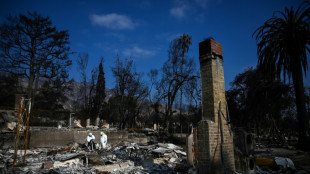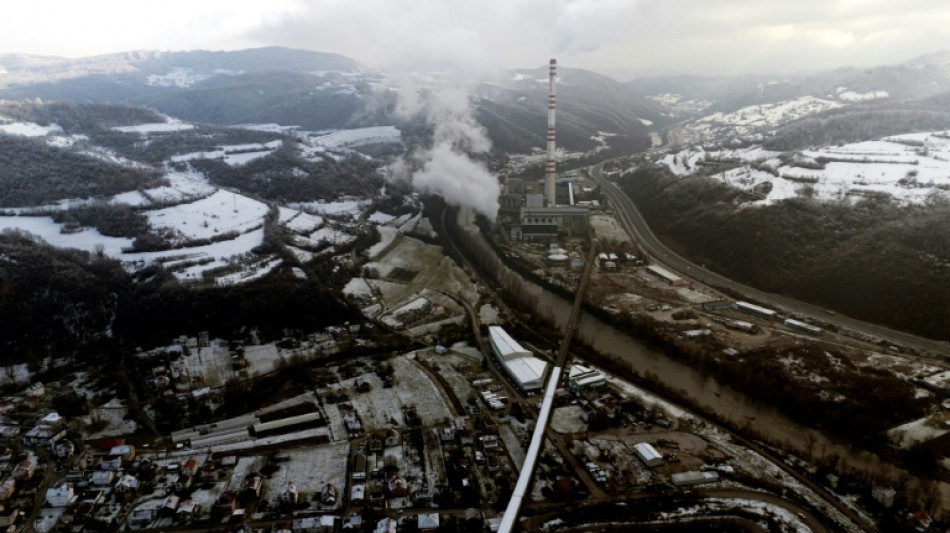
-
 Albon says Thailand taking bid for F1 race 'very seriously'
Albon says Thailand taking bid for F1 race 'very seriously'
-
'It's gone': conservation science in Thailand's burning forest
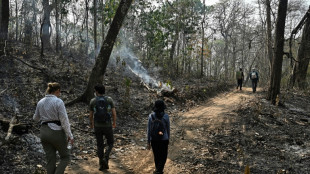
-
 Protest as quake-hit Myanmar junta chief joins Bangkok summit
Protest as quake-hit Myanmar junta chief joins Bangkok summit
-
EU leaders push for influence at Central Asia summit
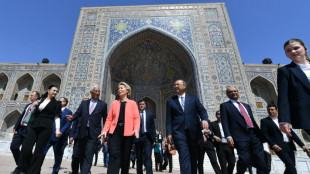
-
 Asian stocks extend global rout after Trump's shock tariff blitz
Asian stocks extend global rout after Trump's shock tariff blitz
-
Lewandowski, Mbappe duel fuelling tight La Liga title race

-
 South Korea court upholds President Yoon's impeachment, strips him of office
South Korea court upholds President Yoon's impeachment, strips him of office
-
Liverpool march towards title as Man City face Man Utd

-
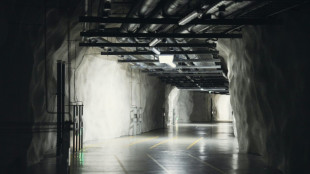 Finland's colossal bomb shelters a model for jittery Europe
Finland's colossal bomb shelters a model for jittery Europe
-
Athletes frustrated as France mulls Muslim headscarf ban in sport

-
 Korda downs Kupcho to stay alive at LPGA Match Play
Korda downs Kupcho to stay alive at LPGA Match Play
-
German industry grapples with AI at trade fair

-
 Irish school trains thatchers to save iconic roofs
Irish school trains thatchers to save iconic roofs
-
'Frightening': US restaurants, producers face tariff whiplash

-
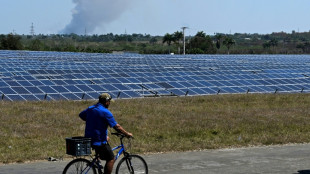 Cuba looks to sun to solve its energy crisis
Cuba looks to sun to solve its energy crisis
-
Experts warn 'AI-written' paper is latest spin on climate change denial

-
 PSG eye becoming France's first 'Invincibles'
PSG eye becoming France's first 'Invincibles'
-
Late birdie burst lifts Ryder to Texas Open lead

-
 Five potential Grand National fairytale endings
Five potential Grand National fairytale endings
-
Trump purges national security team after meeting conspiracist

-
 More work for McIlroy even with two wins before Masters
More work for McIlroy even with two wins before Masters
-
Trump hopeful of 'great' PGA-LIV golf merger

-
 No.1 Scheffler goes for third Masters crown in four years
No.1 Scheffler goes for third Masters crown in four years
-
Where Trump's tariffs could hurt Americans' wallets

-
 Trump says 'very close to a deal' on TikTok
Trump says 'very close to a deal' on TikTok
-
Trump tariffs on Mexico: the good, the bad, the unknown

-
 Postecoglou denies taunting Spurs fans in Chelsea defeat
Postecoglou denies taunting Spurs fans in Chelsea defeat
-
Oscar-winning Palestinian director speaks at UN on Israeli settlements

-
 With tariff war, Trump also reshapes how US treats allies
With tariff war, Trump also reshapes how US treats allies
-
Fernandez fires Chelsea into fourth as pressure mounts on Postecoglou

-
 South Korea court to decide impeached president's fate
South Korea court to decide impeached president's fate
-
Penguin memes take flight after Trump tariffs remote island

-
 E.T., no home: Original model of movie alien doesn't sell at auction
E.T., no home: Original model of movie alien doesn't sell at auction
-
Italy's Brignone has surgery on broken leg with Winter Olympics looming

-
 Trump defiant as tariffs send world markets into panic
Trump defiant as tariffs send world markets into panic
-
City officials vote to repair roof on home of MLB Rays

-
 Rockets forward Brooks gets one-game NBA ban for technicals
Rockets forward Brooks gets one-game NBA ban for technicals
-
Pentagon watchdog to probe defense chief over Signal chat row
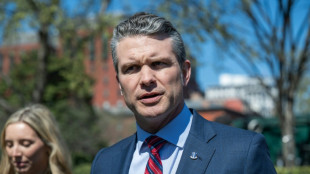
-
 US tariffs could push up inflation, slow growth: Fed official
US tariffs could push up inflation, slow growth: Fed official
-
New Bruce Springsteen music set for June 27 release

-
 Tom Cruise pays tribute to Val Kilmer
Tom Cruise pays tribute to Val Kilmer
-
Mexico president welcomes being left off Trump's tariffs list
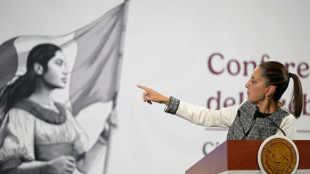
-
 Zuckerberg repeats Trump visits in bid to settle antitrust case
Zuckerberg repeats Trump visits in bid to settle antitrust case
-
US fencer disqualified for not facing transgender rival

-
 'Everyone worried' by Trump tariffs in France's champagne region
'Everyone worried' by Trump tariffs in France's champagne region
-
Italy's Brignone suffers broken leg with Winter Olympics looming

-
 Iyer blitz powers Kolkata to big IPL win over Hyderabad
Iyer blitz powers Kolkata to big IPL win over Hyderabad
-
Russian soprano Netrebko to return to London's Royal Opera House

-
 French creche worker gets 25 years for killing baby with drain cleaner
French creche worker gets 25 years for killing baby with drain cleaner
-
UK avoids worst US tariffs post-Brexit, but no celebrations
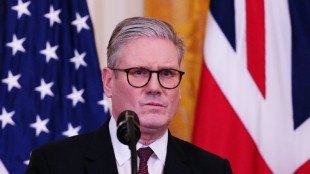

In Bosnia, the path to renewables runs through its coal mines
At 250 metres underground, the dust is thick and oxygen is in short supply at the Mramor mine in northeastern Bosnia.
The facility is the largest underground mine in the country and has long provided the fuel for the nearby Tuzla power station.
But its future -- like that of mines across the country -- is now all but settled, as the Balkan nation prepares to decarbonise the country by 2050.
Until then, mining continues to be done the old-fashioned way in Mramor -- with picks, shovels and dynamite, veteran digger and union representative Senad Sejdic, 52, told AFP.
The work is backbreaking but Sejdic remains hopeful that the anticipated arrival of a modern excavator will make reaching the seam's premium coal an easier task.
"It would allow us to increase the annual haul from 140,000 tonnes to nearly 400,000 and to work in better safety conditions," said Sejdic.
Beyond the economic stakes, Sejdic has as emotional investment: his father was killed in a mining accident in the same area in 1990 that left 180 dead.
Yet the bid to harvest more coal at this site goes against the prevailing current, as the world seeks cleaner energy sources to limit pollution and global climate change caused by carbon emissions.
Coal remains the biggest polluter in Bosnia, where it fuels power plants and homes, with the country burning through approximately 13 million tonnes a year.
"Approximately 3,300 people die prematurely each year in Bosnia due to exposure to air pollution," or nearly 10 percent of all deaths, according to a 2019 World Bank report.
The capital Sarajevo -- where thousands of homes are heated by coal -- was ranked as the most polluted city in the world on Tuesday by the air-quality data platform operated by Swiss company IQAir.
- Power exporter -
Despite its cost to public health, coal remains a lucrative industry in Bosnia.
The government estimates the country has around 2.6 billion tonnes of exploitable coal still underground.
Bosnia also remains the only net exporter of electricity in the Western Balkans.
Nearly 30 percent of its annual production of around 15,000 GWh is sent abroad, according to the national electricity distributor. This earned the country 430 million euros ($453 million) of revenue in 2023, the national statistics office said.
But, like other countries in the region, Bosnia has committed to fully decarbonising its energy sector in the next 25 years.
With the deadline inching closer, the challenge remains stark.
Thermal power plants produce between 55 and 70 percent of Bosnia's electricity at any given time, according to the statistics office.
Hydroelectric plants churn out most of the remaining power used in Bosnia, while just four percent of electricity comes from solar or wind.
"To replace the 2,300 MW produced by thermal power plants, 5,000 MW would be needed from wind turbines or more than 10,000 MW from solar" costing billions of euros in investment, according to Edhem Bicakcic, an energy expert and investor in renewables.
"We very much hope to have access to European funds to carry out this transition," Bicakcic added.
- 'An opportunity' -
To decarbonise the economy, a complex plan has been drawn up that will see the gradual phasing out of its carbon-intensive energy sources.
The public utility company Elektroprivreda BiH will shut two of the six production units on its two coal-powered plants by 2027, said the company's executive director Fahrudin Tanovic.
To continue using its other four blocks from 2028, the company intends to invest more than 170 million euros to install desulphurisation and denitrification systems at its power stations.
"But by 2027 we must in the short term accelerate coal production to ensure sufficient quantities of electricity before acquiring larger renewable energy sites," said Tanovic.
But some still question whether there is the political will to see through the transition process.
For Denis Zisko, an environmental activist with the association Aarhus Centar based in Bosnia, the country's leaders still "lack the political courage" to say openly that mines do not have a future in the country.
"The energy transition is not a problem, it is an opportunity for development," he told AFP.
He said the coal industry will suffer when the European Union introduces its carbon tax -- which is set to be applied gradually to exports from non-EU member Bosnia and across the region in 2026.
But shuttering Bosnia's coal mines and power plants is likely to come with painful costs.
In March, the closure of mining operations at the last functioning pit at the Zenica complex after 144 years left its 600 employees without an income.
To add to their woes, the employees' pensions and taxes had not been covered by the mine for years.
According to official figures, mines across Bosnia face similar dilemmas.
"I have been working in the mine for twenty years," one 47-year-old miner who did not want to give his name told AFP.
"But my contributions have only been paid for four years."
D.Cunningha--AMWN

